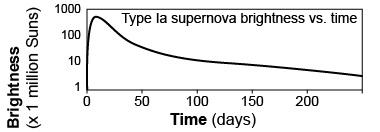- Describe three ways in which you used energy earlier today.
- Describe three kinds of waves (or periodic motion) that you experienced earlier today.
- Describe three different ways in which you interacted with electricity or magnetism earlier today.
- Describe three different ways in which you used optics earlier today to see light.
- Describe three different devices that you used earlier today that were made possible, at least in part, by atomic physics.
 Does physics apply to chemistry? Provide examples to defend your position. Does physics apply to chemistry? Provide examples to defend your position.

 An astronomer observed a rare, bright, exploding star called a supernova and drew a conclusion about how its brightness changed over time. Are her observations repeatable? Why or why not? An astronomer observed a rare, bright, exploding star called a supernova and drew a conclusion about how its brightness changed over time. Are her observations repeatable? Why or why not?
 Analysis of a physics experiment may involve equations with many variables and pages of mathematics. Analysis of a biology experiment might use simpler math. Does this make physics more complicated than biology? Explain your reasoning. Analysis of a physics experiment may involve equations with many variables and pages of mathematics. Analysis of a biology experiment might use simpler math. Does this make physics more complicated than biology? Explain your reasoning.
 We observe that time moves forward, from the past into the future. We do not observe any examples of time moving backward. Now suppose that time could go backward, and that a backward–traveling time machine were possible. Think of a situation in which the rules of cause and effect are violated, therefore making backward time travel impossible in the universe as we know it. We observe that time moves forward, from the past into the future. We do not observe any examples of time moving backward. Now suppose that time could go backward, and that a backward–traveling time machine were possible. Think of a situation in which the rules of cause and effect are violated, therefore making backward time travel impossible in the universe as we know it.
- What is the difference between a theory and a hypothesis? Which one might eventually lead to the other?
- Are qualitative observations scientific?
- Research and write a short report on the role of at least three contemporary scientists conducting research on climate change. Describe the impact that each has had on the development of scientific thought on the subject.
| | - Define science using the vocabulary words theory, experiment, and hypothesis. Note the limitations of science.
- Do the adjectives below describe hypotheses, theories, or both?
- tentative
- testable
- capable of being observed or supported by experimental evidence
- well established
- highly reliable
- based on natural physical phenomena
- subject to change
- Professor Knowsalot proposes a clever hypothesis to explain something. He has not tested his hypothesis by comparing it with any real observations. Nonetheless, the professor is sure his hypothesis is correct, because he has never been wrong before.
- Is this hypothesis correct?
- When would this hypothesis be incorporated into a theory?
- Once his hypothesis became part of a theory, would Dr. Knowsalot be the only one who can test the theory?
- Can scientific theories change, and if so, how?
- Write down a statement you might give on a radio station to describe why you think light has energy. Your statement should use the word “because” and present at least one observable property of light that supports your statement.

- The chart above lists three things that occur and three potential consequences that may follow from them. Pair up the correct consequence with its cause by speaking (or writing) three sentences that have the form “______ is/are a cause of _____.”
- Describe the steps of the scientific method.
- What happens when someone discovers a natural phenomenon or develops technology that contradicts an existing theory?
- Your friend has a hypothesis that there is an angry monster with 20 teeth at the center of every black hole. Is this a good scientific hypothesis? Explain.
- Relativity has been tested by many independent researchers and is well established as a good description of natural and physical phenomena. Is relativity a theory or hypothesis?
|

